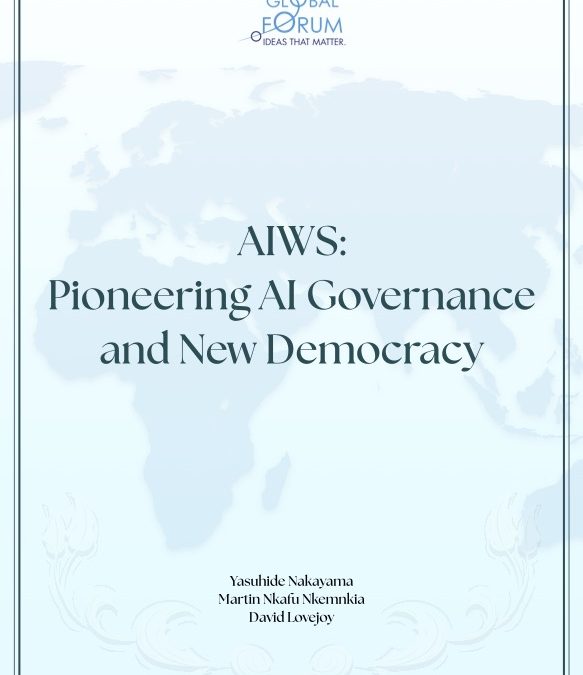
by Editor | Apr 28, 2024 | Papers & Reports, News, Publications
The PDF of this publication can be viewed here — AIWS: Pioneering AI Governance and New Democracy
Yasuhide Nakayama
Martin Nkafu Nkemnkia
David Lovejoy
AIWS: Pioneering AI Governance and New Democracy
Since its inception in November 2017, the Artificial Intelligence World Society (AIWS), founded by the Boston Global Forum (BGF), has been at the forefront of shaping the governance of artificial intelligence (AI) and fostering new models of democracy. Through collaborations with global leaders and top AI thinkers, AIWS has introduced innovative initiatives and frameworks aimed at harnessing AI for the betterment of society.
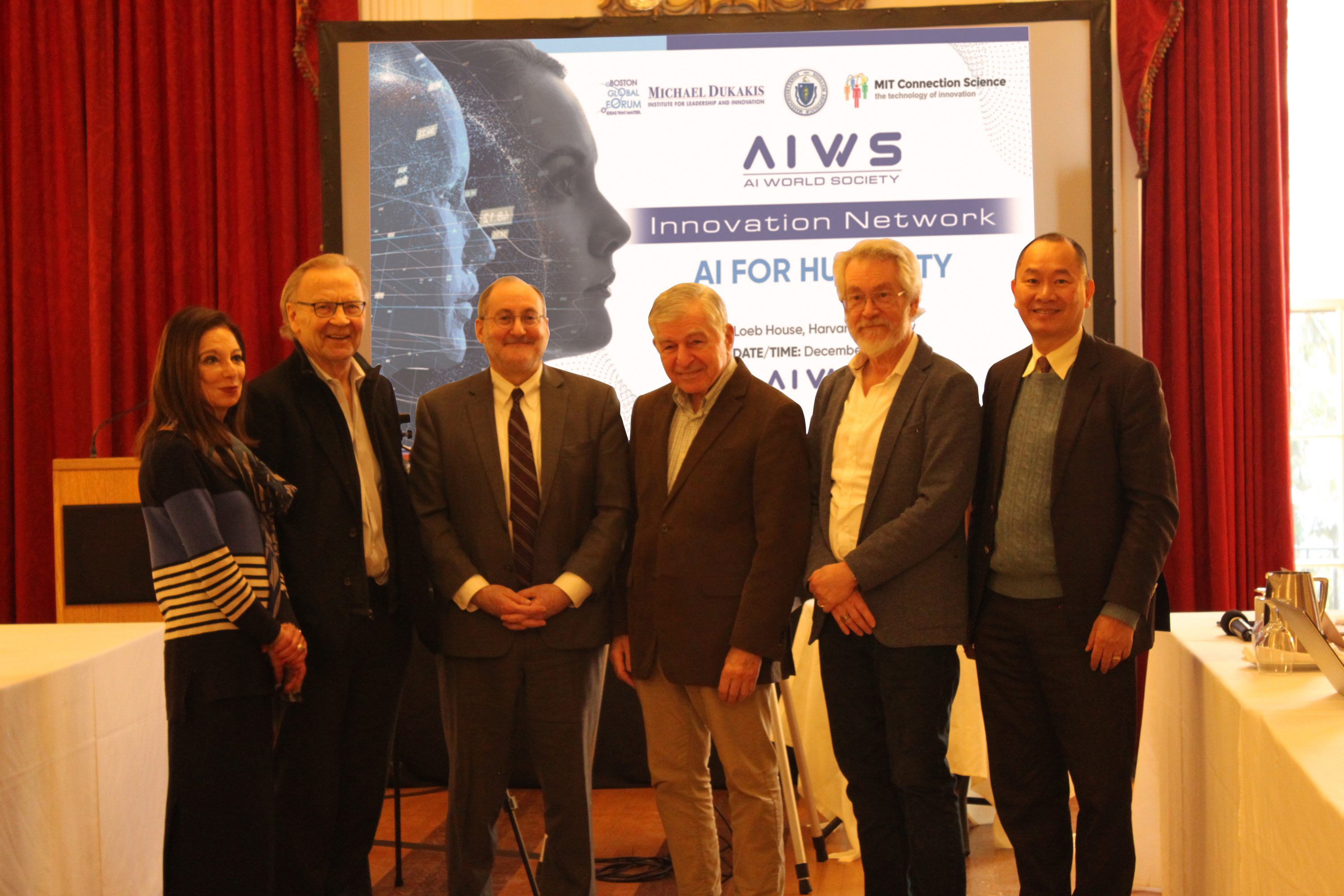
World Leader in AI World Society Award
Boston Global Forum annually recognizes and honors distinguished leaders for their exemplary leadership and contributions in promoting AI for a better world with the World Leader in AIWS Award starting from 2018.
BGF organizes the Conference “Governing the Future: AI, Democracy, and Humanity” on April 30, 2024, at the prestigious Harvard University Loeb House to honor Alondra Nelson, former Deputy Assistant to President Joe Biden, former Acting Director of the White House Office of Science and Technology Policy, with the 2024 World Leader in AIWS Award. This conference served as a platform to recognize Nelson’s exceptional contributions to AI governance and to explore the intersection of AI, democracy, and humanity.
The prestigious award recognizes Dr. Nelson’s outstanding contributions to shaping global public policy, the governance of artificial intelligence (AI), and our understanding of the societal dimensions of AI development and deployment.
During her tenure at the White House Office of Science and Technology Policy (OSTP), Dr. Nelson spearheaded the development of the “Blueprint for an AI Bill of Rights,” which was incorporated into both President Biden’s historic executive order on artificial intelligence and enacted into policy for the federal government. In leadership at OSTP, she also provided guidance to expand taxpayer access to federally funded research, served as an inaugural member of the Biden Cancer Cabinet, strengthened evidence-based policymaking, and galvanized a multisector strategy to advance equity and excellence in STEM.
Prior recipients of the AIWS World Leader Award have included Ambassador Amandeep Singh Gill, the United Nations Envoy on Technology; Stavros Lambrinidis, European Union Ambassador to the United States; Internet pioneer Vint Cerf; and Sanae Takaichi, the Japanese Minister of State for Economic Security.
AIWS Contributes AI Governance to G7 Summit from 2018: Next Generation Democracy
At the BGF-G7 Summit in 2018, AIWS unveiled the groundbreaking AIWS 7-Layer Model to Build Next Generation Democracy. This model serves as a roadmap for a future where AI is leveraged to enhance creativity, innovation, tolerance, democracy, and individual rights. It emphasizes the role of AI in assisting government decision-making and empowering citizens to participate in governance.
The following year, at the AIWS-G7 Summit Initiative in 2019, held at Harvard University’s Loeb House, AIWS introduced the concept of The Next Generation Democracy – AI World Society. This initiative envisions a society where AI fosters transparency, inclusivity, and citizen engagement in governance. It comprises three key components: AI-Government, AI-Citizen, and AI Government Index, aimed at promoting accountability and efficiency in government operations.
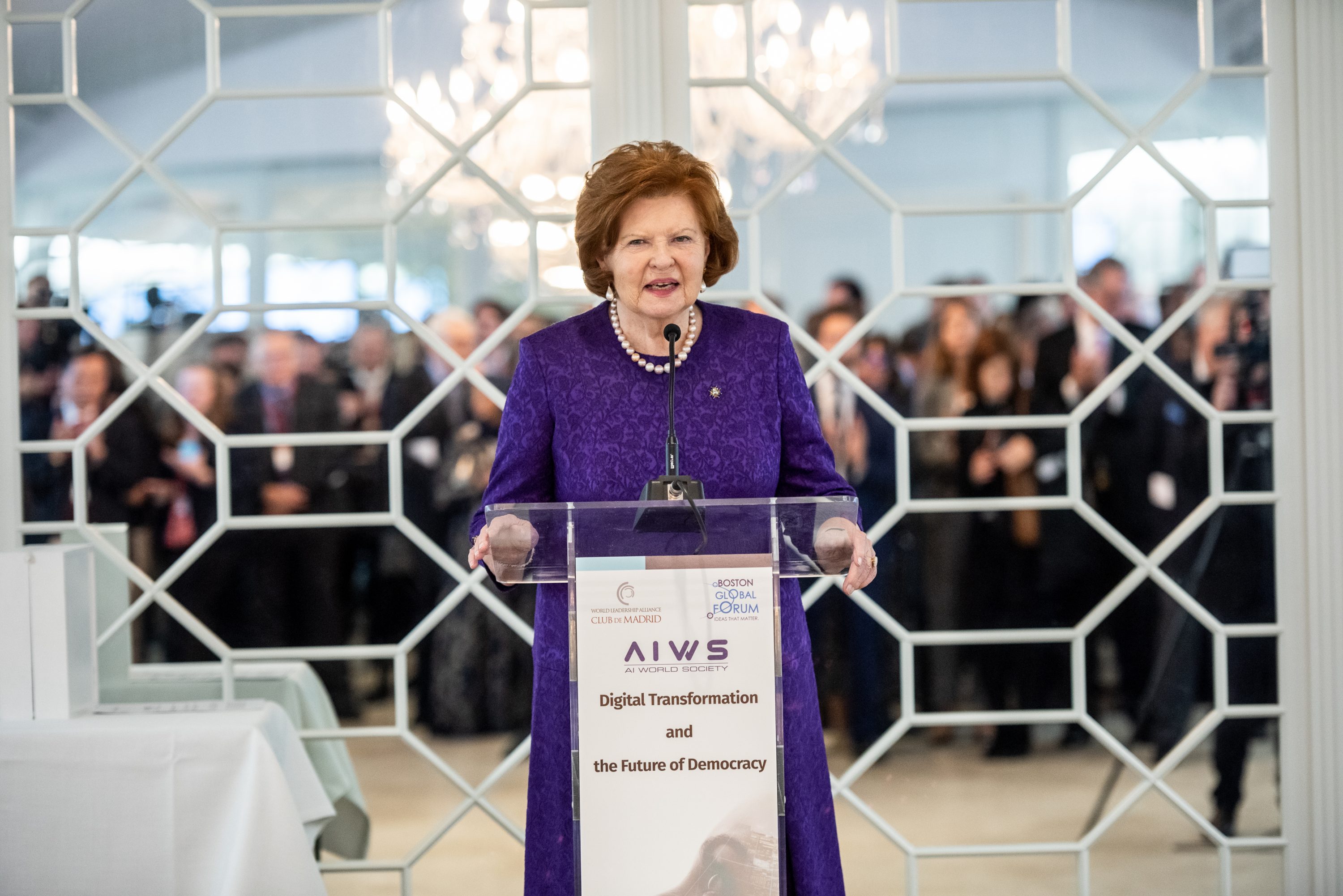
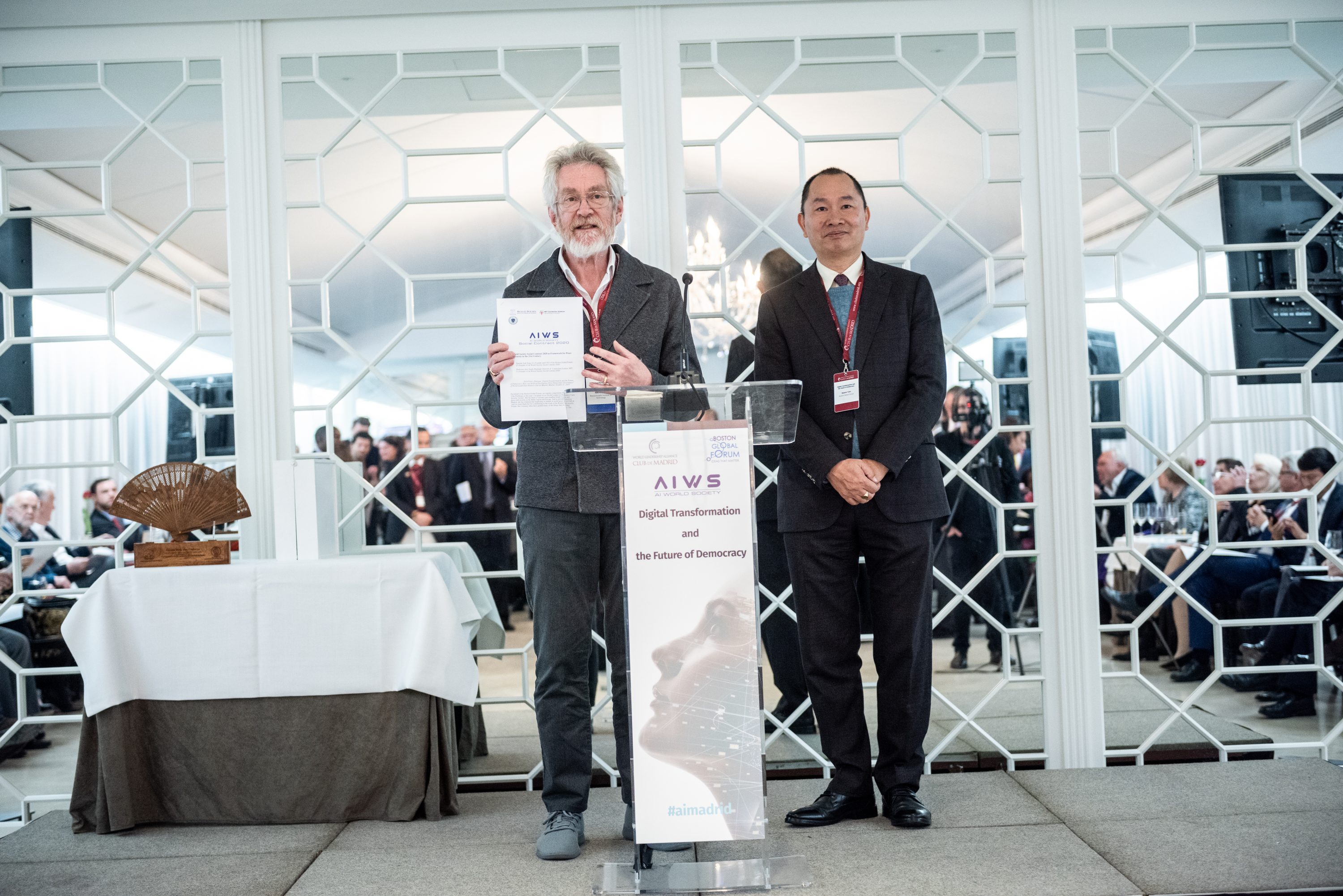 Collaborate with Club de Madrid from 2019: the Social Contract for the AI Age and AIWS Model
Collaborate with Club de Madrid from 2019: the Social Contract for the AI Age and AIWS Model
In 2020, the collaboration between Club de Madrid and BGF resulted in the Policy Lab ‘Transatlantic Approaches on Digital Governance,’ where former heads of state and government, along with experts, discussed global policies for managing digital technologies and AI. The lab announced the Social Contract for the AI Age and supported AI World Society, urging world leaders to endorse and implement it.
Continuing its efforts, Club de Madrid and BGF launched a five-year initiative in 2021 to develop a human-centered agenda for digital transformation and governance. This initiative aims to build global consensus around principles that prioritize human rights and ethical considerations in digital societies.
At the Policy Lab ‘Fundamental Rights in AI & Digital Societies’ in 2021, the Global Alliance for Digital Governance (GADG) was established, fostering collaboration between BGF and the World Leadership Alliance-Club de Madrid to address the ethical and legal challenges posed by AI.
In 2020, the Boston Global Forum and the Riga Conferences collaborate for platforms for discussing AI governance and societal implications. Notably, the publication of the policy brief “Social Contract for the Artificial Intelligence Age” at the Riga Conference 2020 underscored the importance of safety, security, and sustainability in the AI era.
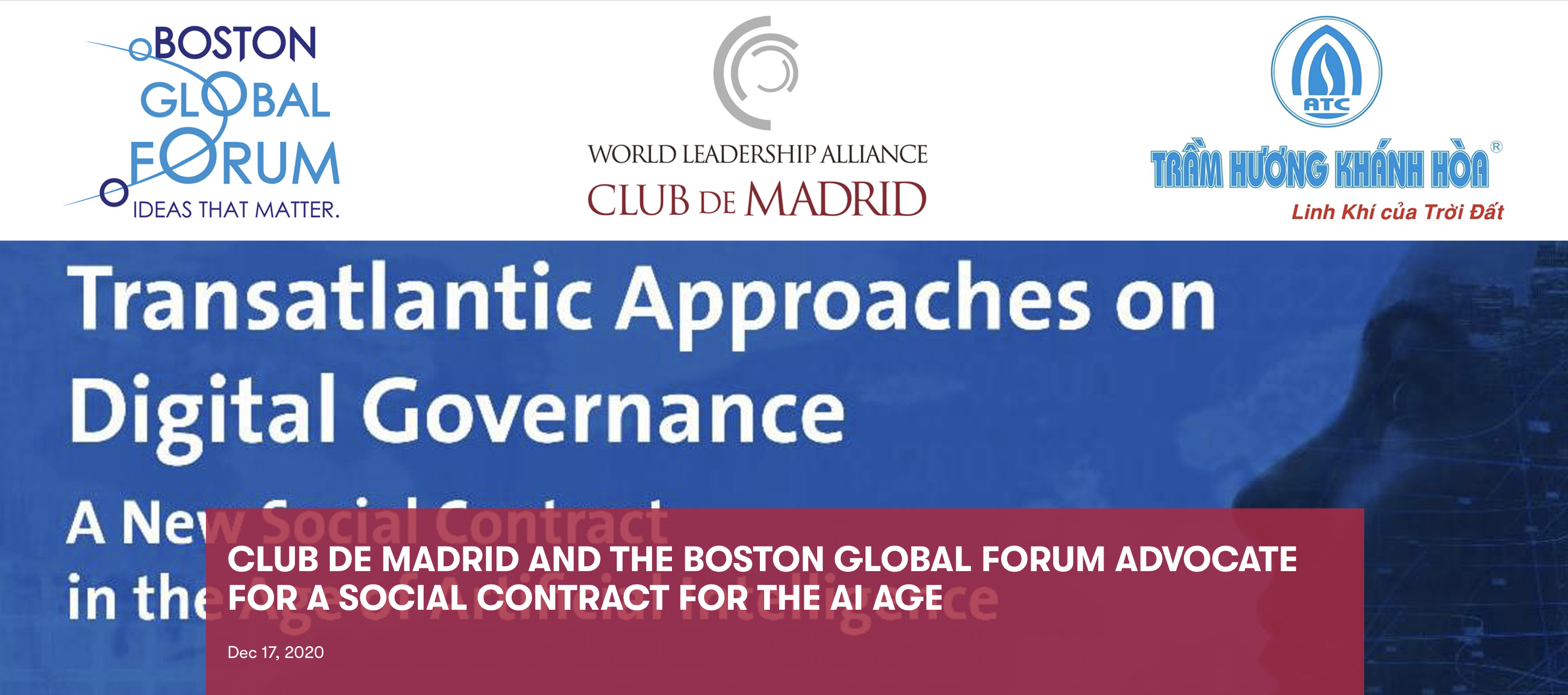
Collaboration with the United Nations in AI Governance from 2019: Remaking the World – Toward an Age of Global Enlightenment
In 2021, the Boston Global Forum and the Riga Conference 2021 collaborated to organize a special event: “Remaking the World – The Second Age of Enlightenment – The United Nations 2045”. This discussion was a notable highlight of the Rīga Conference 2021 and was co-organized by the Latvian Transatlantic Organisation and the Boston Global Forum.
The event aimed to commemorate the United Nations Centennial initiative, launched by the Boston Global Forum (BGF) and the United Nations Academic Impact (UNAI) in 2019. This initiative was established as the United Nations prepared to mark its 75th anniversary in the following year, with a vision to anticipate the world and the United Nations in 2045, the year of the world organization’s centennial.
Key messages from the event highlighted the core concepts outlined in the book “Remaking the World: Toward an Age of Global Enlightenment”. These concepts include the idea of a Social Contract for the Artificial Intelligence (AI) age, a framework for an AI international accord, an ecosystem for the “AI World Society” (AIWS), and a community innovation economy. The event brought together some of the finest minds of our times to envision a future where AI is harnessed to foster global enlightenment and societal progress.
The Riga Conference 2023 published the Boston Global Forum Special Report “How to Govern AI in an Age of Global Tension” as the Policy Brief of the Riga Conference 2023.
C20-G20 Summit 2023 in India: Recognize AI World Society and the Social Contract for the AI Age
At the C20-G20 Summit in India in 2023, the recognition of the Social Contract for the AI Age and AI World Society highlighted the global significance of AI governance and the need for international cooperation.
Through its pioneering initiatives and collaborations, AIWS continues to drive conversations and actions toward a future where AI is harnessed responsibly to benefit humanity and advance democratic principles on a global scale.
President of European Commission Ursula von der Leyen highlighted in her speech at the Boston Global Forum Conference on December 12, 2020: “It is such an honour to be here with you today. At the Boston Global Forum and Michael Dukakis Institute for Leadership and Innovation, you are at the forefront of research and debate. And you definitely work on some of the world’s most pressing issues. You drive the discussion on digital policy and how a human-centric approach on AI could look like. This is an issue whose importance simply cannot be overestimated.”
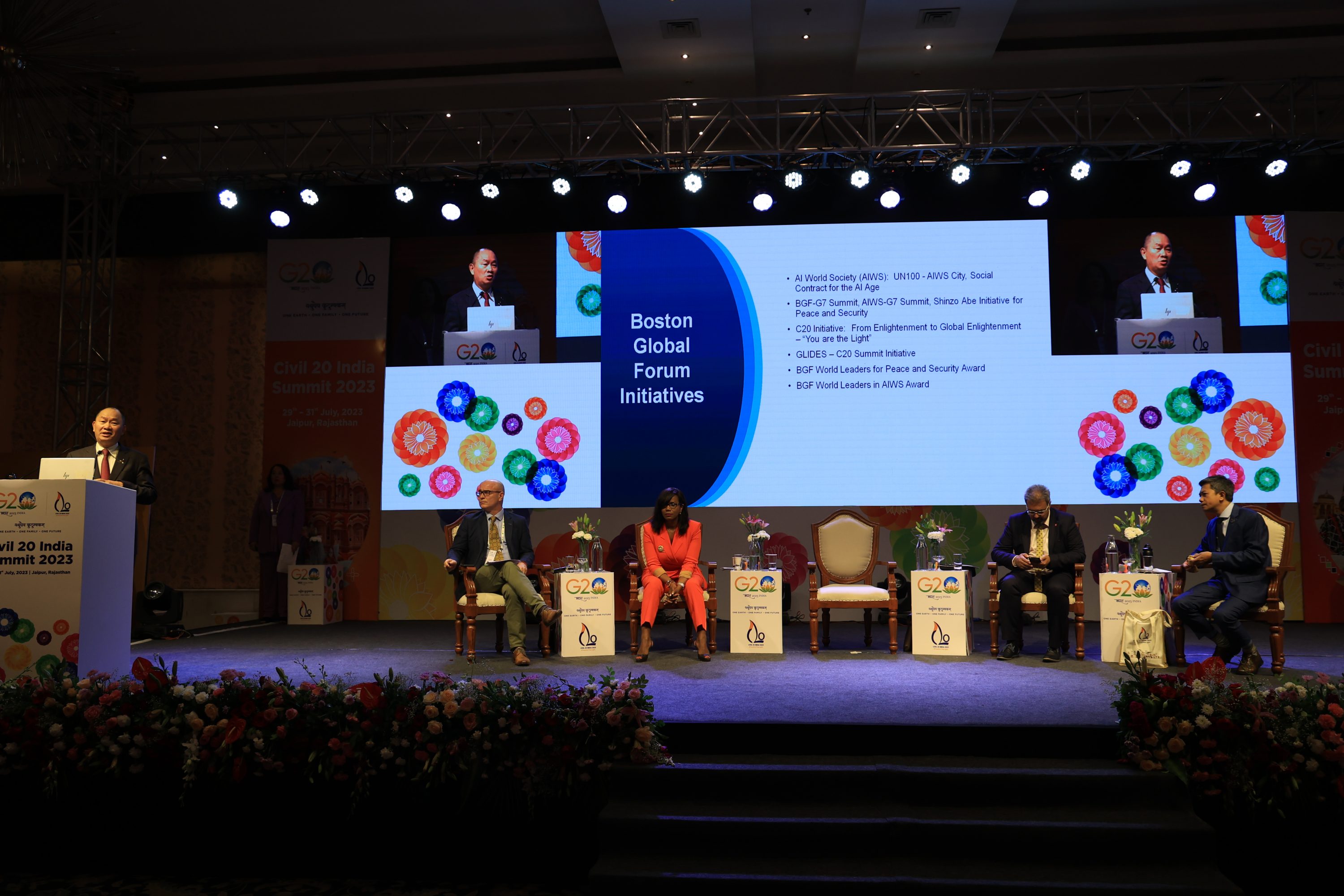

by Editor | Jun 2, 2024 | News
The drama in the Four Pillars topic last week revolved around the questions over allowing Ukraine to strike Russia with NATO supplied weapons. While most European members, such as Denmark, Poland, France, Germany, have publically approved usage, the US, a Pillar, remains wavering or ambiguous. It is said that the Biden administration allowed some, but not all, weapons to be used on Russia, and the White House has denied allowing Ukraine to use specific weaponries, as reported in the media. Hopefully this is some strategic ambiguity rather than a flip-flop or wavering commitment from the US, a Pillar, when the defense of Europe, another Pillar, against the Russia-China danger hinges on the situation in Ukraine. In fact, NATO members have been debating whether or not to shoot down Russian drones and missiles over Ukrainian airspace – perhaps a quasi-no-fly-zone.
In the meantime, it seems that Russia’s offensive on Kharkiv has stalled for now, but one should wait and see when the fog of war is lifted in this theatre. However, as the war continues to wear on both soldiers and civilians alike, time is not in Ukraine’s favor unfortunately. The ammunition famine has been well reported, but the high quantity of the dead is starting to take a toll on performance and economy.
At the Shangri La Dialogue, there continues to be the bridging between the Four Pillars, or the three in the Indo-Pacific of the US, Japan, and India. The US and India have signed agreements on co-producing Strykers – one of the most advanced armored vehicles available right now, perhaps a gesture of good faith from the US. This means that both countries are looking to continue upgrading and strengthening their relationship, especially against China.
Japan has also continued to develop and mend relations with its non-PRC neighbors, as ties between Japan and South Korea have been warming in recent years due to the rising threat of China. However, both countries would do well to maintain this new but somewhat uneasy relationship even after the current leaders of both countries are no longer in power – for this is not just the Pillars’ interest to demonstrate a front of unity against Russia and China, but for the whole Indo-Pacific region too.
Articles of the week – Inside the NATO debate over protecting Ukraine’s skies [Semafor]; Ukraine Is Running Short of People [Bloomberg]

REUTERS/Kacper Pempel/File Photo
Minh Nguyen is the Chief Editor of the Boston Global Forum and a Shinzo Abe Initiative Fellow. She writes the Four Pillars column in the BGF Weekly newsletter.
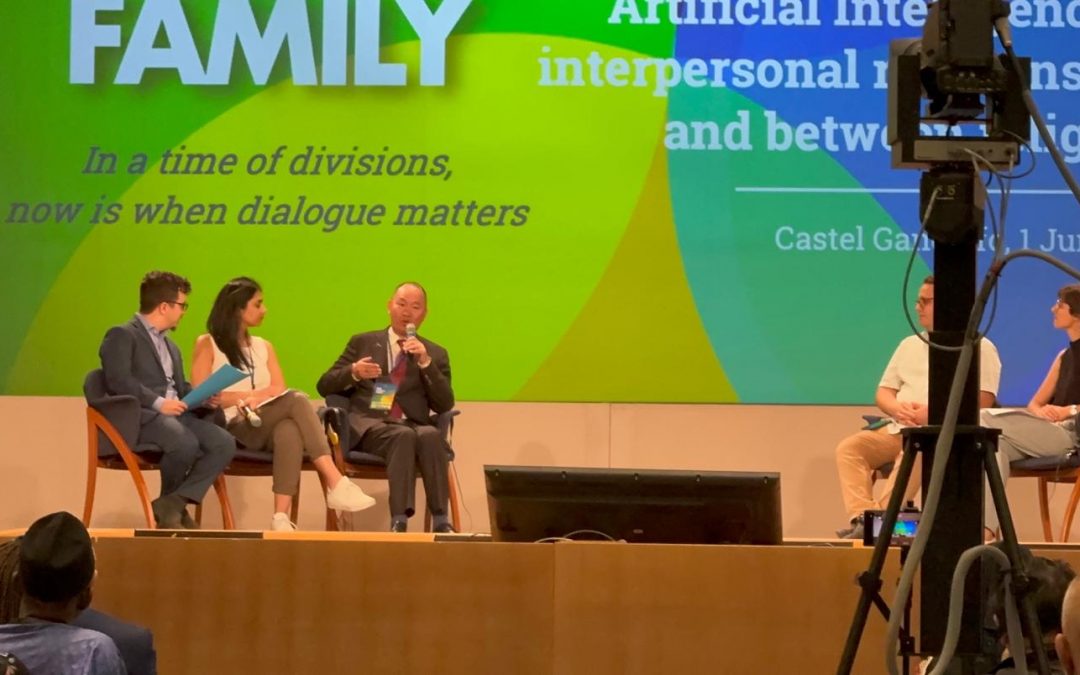
by Editor | Jun 2, 2024 | News
On June 1, 2024, the International Inter-religious Conference at the Vatican marked a historic milestone with the groundbreaking ideas presented by Boston Global Forum CEO Nguyen Anh Tuan. At the panel titled “The Impact of Artificial Intelligence on Interpersonal Relationships and Between Religions.”
In his address, Nguyen Anh Tuan emphasized the crucial role of interfaith and interreligious cooperation in the era of artificial intelligence. He introduces BGF’s the Knowledge Platform for AI, Tuan announced that the Boston Global Forum would collaborate with religious leaders to ensure Equality of Opportunity for every person, company, and country in AI, fostering a new democracy, happiness, and safety for humanity.
Approximately a thousand participants representing seven major religions attended this significant event. The panel featured testimonials from individuals of various faiths, highlighting the profound impact of AI on their communities. Fadi Chehade, in dialogue with the youth, and Nguyen Anh Tuan’s compelling insights were key highlights of the session.
Following Tuan’s presentation, numerous participants and organizations eagerly approached him to discuss potential collaborations with BGF in this initiative. The enthusiasm and interest demonstrated the global resonance of his ideas and the potential for wide-reaching partnerships.
The panel moderator posed three thought-provoking questions to Nguyen Anh Tuan:
- Ethical Challenges of AI in Diverse Applications:
“Speaking of AI today, we face an ethical challenge. If, for example, on the one hand, there are positive advances in medical robotics, on the other hand, we have a major influence on weaponry (e.g., armed drones and LAWS). What is the situation, and how do morals and ethics stand on such important issues?”
- The Drive Behind BGF’s AI Ethical and Governance Initiative:
“We know that with the Boston Global Forum, you have done a lot of work on this topic with an innovative project that puts ethical knowledge with influences from various religions at the service of AI. What prompted you to do this?”
- Addressing Big Tech’s Dominance in AI:
“How do we solve the problem of big tech dominating the market and AI?”
Nguyen Anh Tuan’s responses underscored the importance of ethical considerations and the integration of diverse religious perspectives in shaping AI’s future. His vision for a balanced and inclusive AI landscape resonated deeply with the audience, sparking further discussions on collaborative efforts to achieve these goals.
The event at Castel Gandolfo not only highlighted the intersection of technology and faith but also set the stage for a united global effort towards an equitable and ethical AI-driven future. The Boston Global Forum’s commitment to this cause promises to drive significant advancements in AI governance and interfaith cooperation, paving the way for a more just and prosperous world.
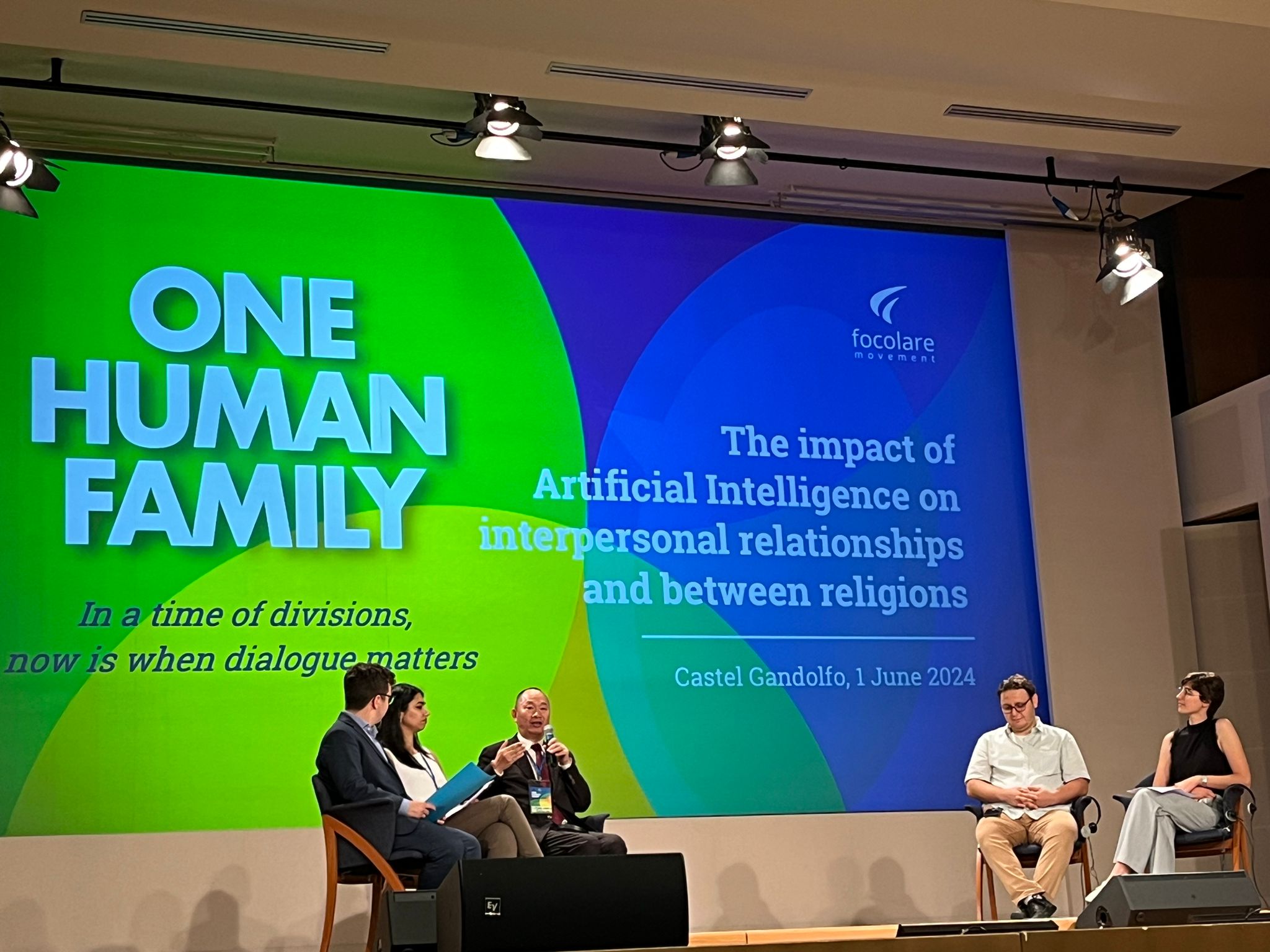
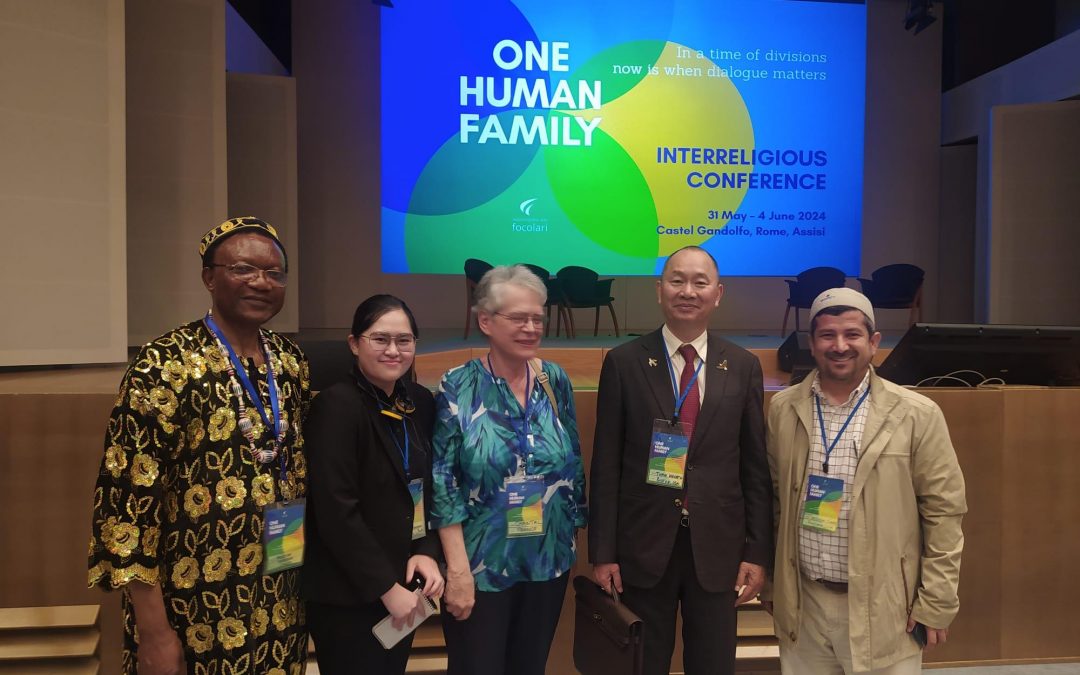
by Editor | Jun 2, 2024 | Global Alliance for Digital Governance
Castel Gandolfo, June 1, 2024 – with a goal in AI governance, the Boston Global Forum and the Focolare Movement will collaborate on promoting equality of opportunities in artificial intelligence (AI). This collaboration came out of discussions in the International Interreligious Conference 2024.
During the conference, leaders from BGF and the Focolare Movement called for an action plan to ensure that AI development and implementation foster equality among companies, individuals, and nations. This initiative aims to address the growing disparities in AI access and benefits, promoting a more inclusive and fair technological future.
A Call for Global Collaboration
Nguyen Anh Tuan, CEO of the Boston Global Forum, highlighted the importance of interfaith and interreligious cooperation in achieving these goals. He emphasized the need for ethical AI practices that are inclusive and equitable, ensuring that no person, company, or country is left behind in the AI revolution.
The action plan discussed at the conference includes several key initiatives:
Promoting Fair Competition Among Companies: Strategies to prevent monopolistic practices and encourage collaboration and knowledge sharing among tech firms.
Ensuring Individual Opportunities: Educational programs to enhance AI literacy and skills, particularly for underrepresented groups.
Balancing Opportunities Among Countries: Frameworks for international cooperation and resource sharing, with a focus on supporting developing nations in AI adoption based on spiritual values of religions and standards of the Social Contract for the AI Age of AI World Society.
Key Discussions and Insights
Approximately a thousand participants representing seven major religions attended the event. The panel sessions included testimonials from various religious leaders and highlighted the ethical challenges and opportunities presented by AI.
Dr. Fadi Chehade, in dialogue with the youth, and Nguyen Anh Tuan’s compelling insights were key highlights in Day 2 of the conference. The discussions underscored the potential of AI to transform societies while also stressing the need for ethical guidelines and global cooperation. The International Interreligious Conference 2024 not only highlighted the intersection of technology and faith but also set the stage for a united global effort towards an equitable and ethical AI-driven future. The Boston Global Forum’s collaboration with the Focolare Movement promises to drive significant advancements in AI governance and interfaith cooperation, paving the way for a more just and prosperous world.

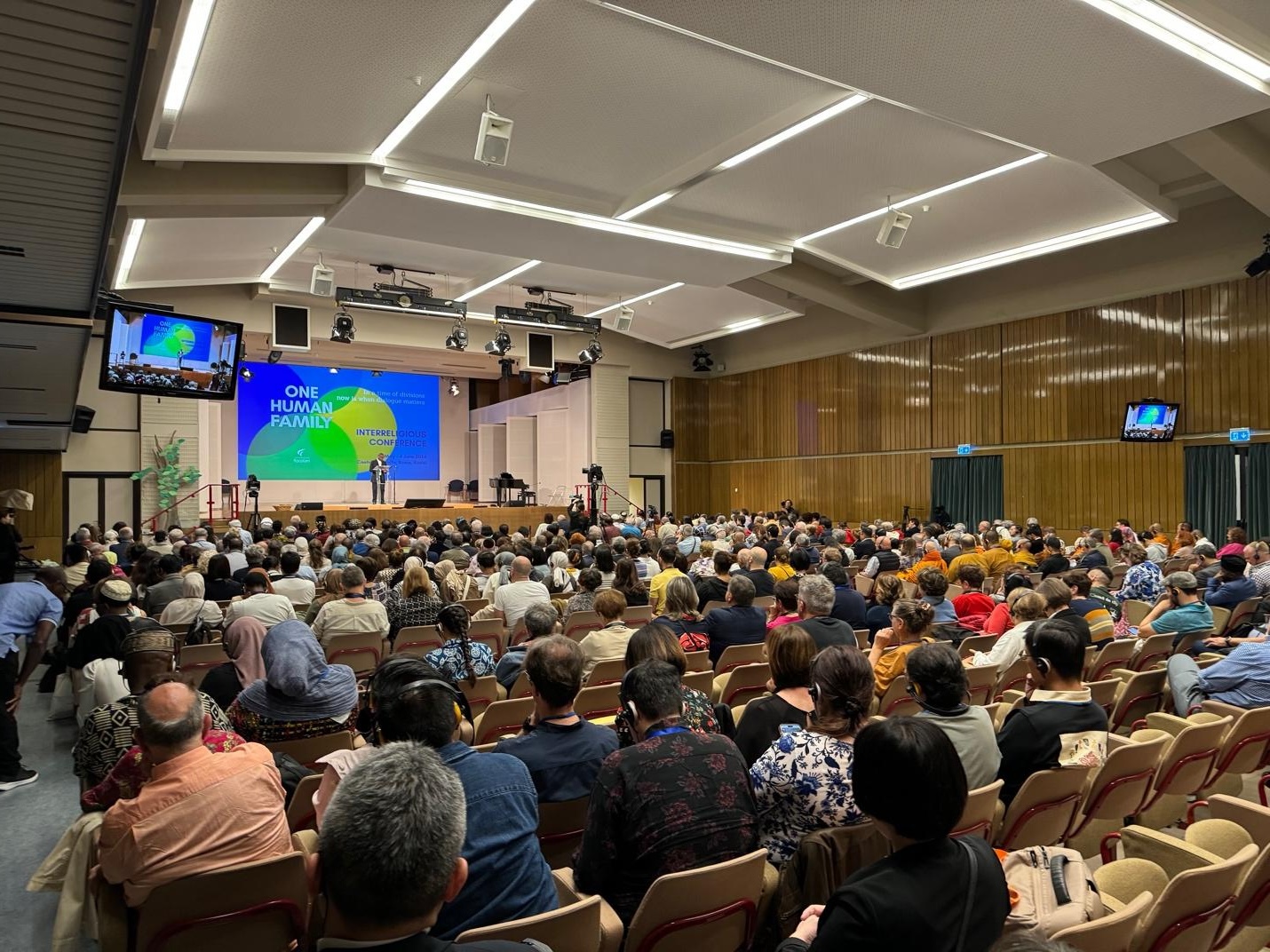
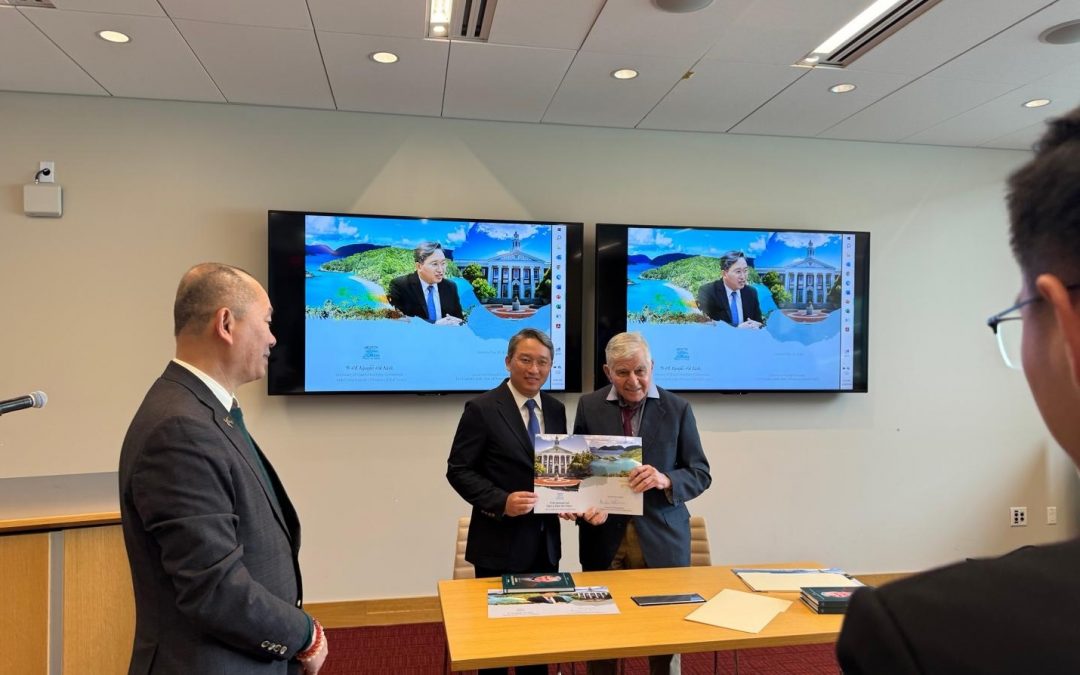
by Editor | Jun 2, 2024 | News
In a significant move to strengthen international ties and foster development, the Boston Global Forum (BGF) co-hosted a conference with the Harvard Kennedy School’s Shorenstein Center, welcoming a delegation from Khanh Hoa province, led by HE Nguyen Hai Ninh, Secretary of the Provincial Party Committee of Khánh Hoà. The event marked a pivotal moment for the collaboration between Nha Trang Khanh Hoa and the Boston Global Forum and Massachusetts.
The conference saw the attendance of top leaders from Khanh Hoa province and Nha Trang city, alongside a delegation of business leaders. Together, they discussed the “Nha Trang Khanh Hoa Spark Program,” an initiative designed to support the development and global integration of Nha Trang Khanh Hoa.
To help Nha Trang Khanh Hoa deeply connect with Boston and Massachusetts, the Boston Global Forum contributes the Nha Trang Khanh Hoa Spark Program, which aims to connect Nha Trang Khanh Hoa with Boston and the Eastern United States, Japan, Europe, and India, bringing intellectual, innovative, and financial resources to help develop Nha Trang Khanh Hoa.
The Nha Trang Khanh Hoa Spark program includes key initiatives:
1. Nha Trang Khanh Hoa Spark Community: Creating connections between the intellectual, innovative community at Harvard University, MIT, and other universities, research centers, and innovation hubs in Boston to support and help Nha Trang Khanh Hoa.
2. Establishing the AIWS Forum between Boston – Nha Trang – Washington DC – Tokyo – Bengaluru – Rome to create special ties among distinguished communities in these cities and link events between Boston, Nha Trang, and Tokyo, laying the foundation for a new image and credibility for Nha Trang Khanh Hoa as a global gem.
3. Launching the Boston – Nha Trang Investment Forum to attract investment resources from the United States to Nha Trang Khanh Hoa. Khanh Hoa serves as a getway for Massachusets to invest and do business in Vietnam.
4. Initiating the Forum for Building an Advanced Healthcare Ecosystem in the AI Era to discuss and invest in developing a high-quality healthcare system for Nha Trang Khanh Hoa.
5. Contributing to the Innovative Nha Trang Citizens Program:
- Assisting Nha Trang in implementing the Innovative Nha Trang Citizens Program, enabling each citizen to use the internet, mobile technology, and AI to build innovative businesses, seize opportunities presented by AI and digital technology, and mitigate associated risks and challenges.
6. Raising Awareness and Appreciation, Bringing Great Minds and Esteemed People to Support Nha Trang Khanh Hoa:
- Promoting Nha Trang Khanh Hoa with AI and Advanced Platforms: Using AI to promote Nha Trang Khanh Hoa throughout the United States, including connecting with top media outlets, supported by AI and validated by humans. Journalists and influencers will create engaging stories to highlight the region’s natural beauty, people, and cultural values.
- Hosting Global Thinkers and Innovators: Hosting discussions among thinkers, innovators, and leaders of the AI World Society in Nha Trang Khanh Hoa to announce pioneering global initiatives and solutions using AI and digital technology to build a better world.
- Connecting Nha Trang Khanh Hoa with Major Global Cities: Connecting Nha Trang Khanh Hoa with Boston, Washington DC, Tokyo, Bengaluru and Rome by organizing events that link communities in these cities. This includes promoting events like the Sea Festival in Nha Trang and integrating technical, innovative, cultural and artistic events in Boston, Tokyo, and Nha Trang Khanh Hoa. During major cultural and technological events in one city, the other cities will participate by providing input, sending representatives, and interacting online with the elite communities of the other cities.
- Advising on Event Optimization and Global Connectivity: Advising Nha Trang Khanh Hoa to optimize and elevate its events to a global level and connect them with Boston and Tokyo.
- Advising on Products and Services: Assisting with the introduction of products and services from Nha Trang Khanh Hoa to the world.
- Developing Nha Trang Khanh Hoa into a World-Class Tourism and Innovation City: Providing solutions to develop Nha Trang Khanh Hoa into a world-class tourism and innovation city, akin to a gem of East Asia.

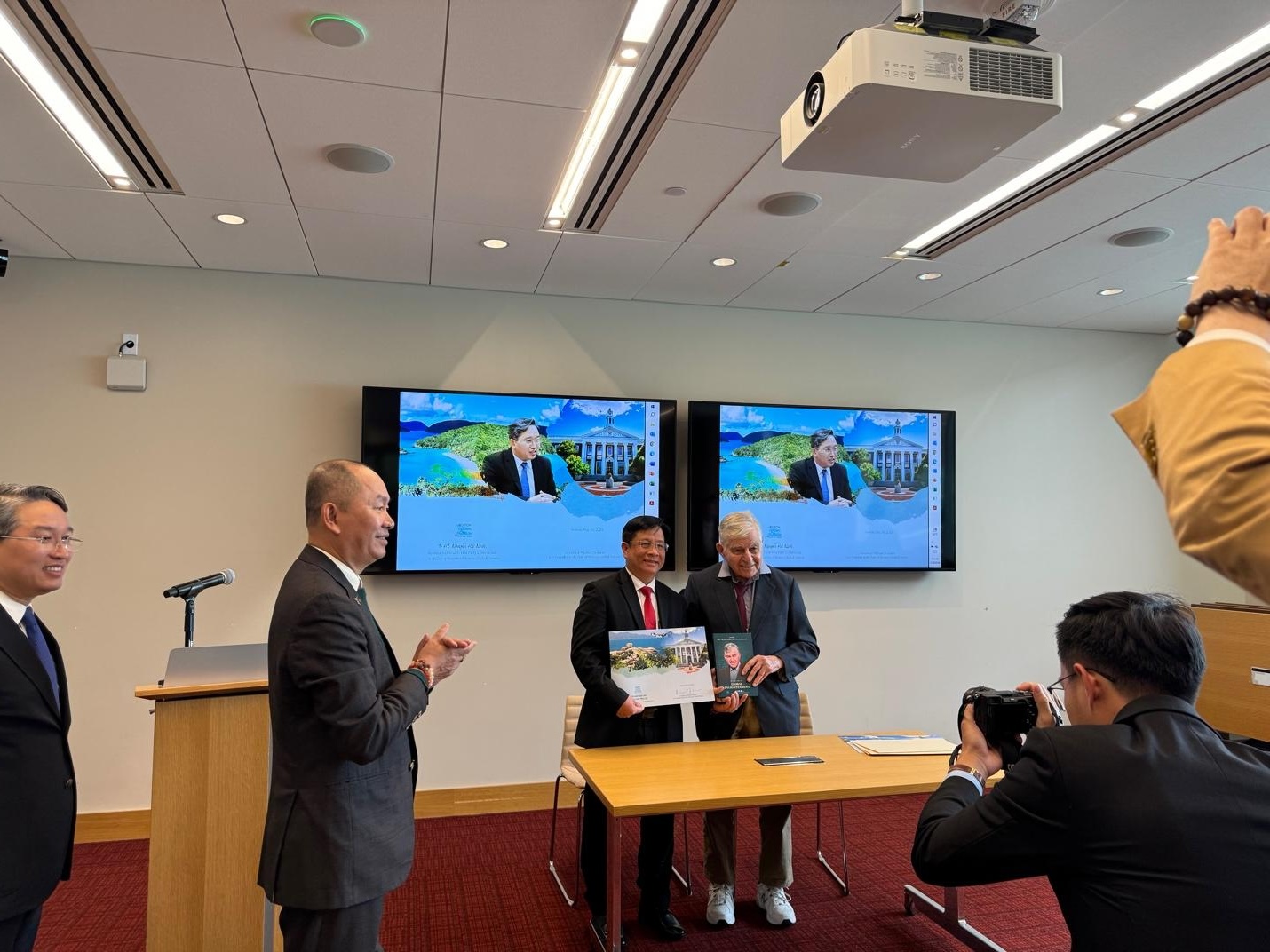
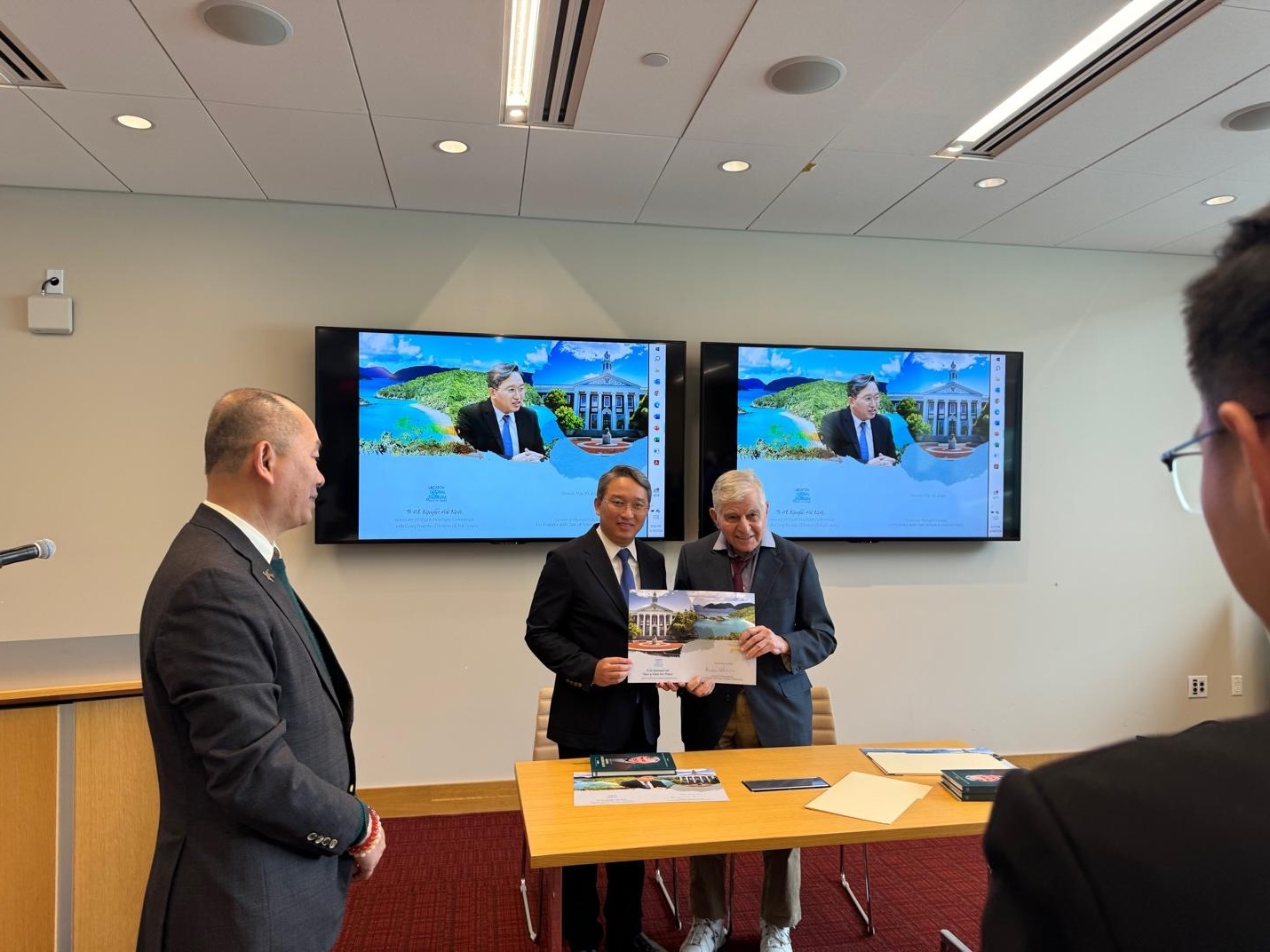
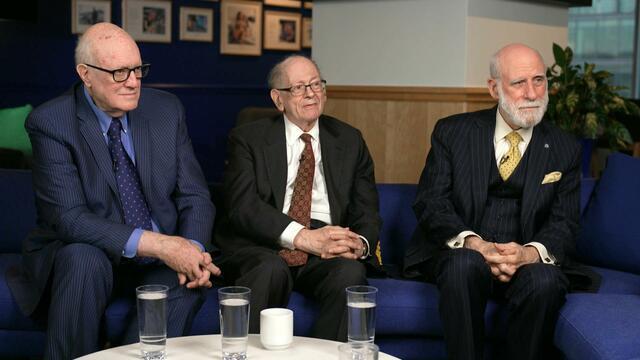
by Editor | Jun 2, 2024 | News
This article was originally published in CBS News.
In an era where the answers to the most random questions — like the indoor land speed record or the Earth’s weight — are just a few clicks away, we often take for granted the colossal network that makes it all possible: the internet. At the heart of this technological marvel are pioneers such as Vint Cerf, Steve Crocker and Bob Kahn, whose groundbreaking work has woven the fabric of the digital world we live in today.
Despite their monumental achievements, these innovators remain modest about their contributions. “One of the big issues about the internet is that most people don’t really have a good idea of what it is,” Kahn said.
Their journey began with a simple, yet revolutionary, idea: developing the technologies and software necessary to send data from one computer to another, eventually reaching across the globe.
“I don’t think the internet is a physical thing. I think it’s the implementation of the internet protocols that’s physical,” Kahn said.
“Bob is taking an interesting philosophical view of this,” said Cerf. “There are descriptions of how the thing is supposed to work and you have to implement those descriptions in things called computers and routers and things like that.”
“It’s the description of how it’s supposed to work that’s important. So you can keep building new things to work in new ways to make the internet even more interesting,” said Cerf.
That’s what allowed their early networks to blossom into a whole universe of interconnected laptops and smartphones and speakers and headsets. All of which changed the way we — and they — get things done.
The astonishment never fades for Cerf, who finds incredible “all the stuff that had to work” for a simple Google search to return results.
The internet’s origins trace back to a military tool — the ARPANET — developed in collaboration with figures like Joseph Haughney, a retired major in the U.S. Air Force who died last month. A precursor to the internet, ARPANET was developed to help the military, sharply different from from the internet’s current role as a platform for socializing, entertainment and community building.
“We always had this technology that my dad would kind of wheel it in and then show it to my mom, and no one really knew what it was,” recalled Haughney’s daughter, Christine Haughney Dare-Bryan.
As her father got older, Dare-Bryan, an editor at Inc. magazine, decided to record his stories, building a podcast all about the founders of the internet. She selected a term her father had previously used to label some of these innovators for the podcast’s name.
“He called them these ‘computer freaks.’ He didn’t want these computer freaks coming on and kind of hurting or harming his beloved ARPANET. And instead, we had something that was being used for, you know, socializing and finding communities,” said Dare-Bryan.
But for all the ways their work has improved our lives — and there are a lot of them — it’s also introduced some challenges for privacy and personal connections.
The ease of spreading misinformation and disinformation has become a significant concern. Cerf said he has no regrets and sees the internet’s misuse as a human issue, not a technological flaw. “It’s their responsibility,” Cerf said.
“I just hope that something like the internet will continue to be part of the society that we live in and that maybe some, you know, in some distant time, somebody will remember I had a tiny role to play in it,” Cerf said.

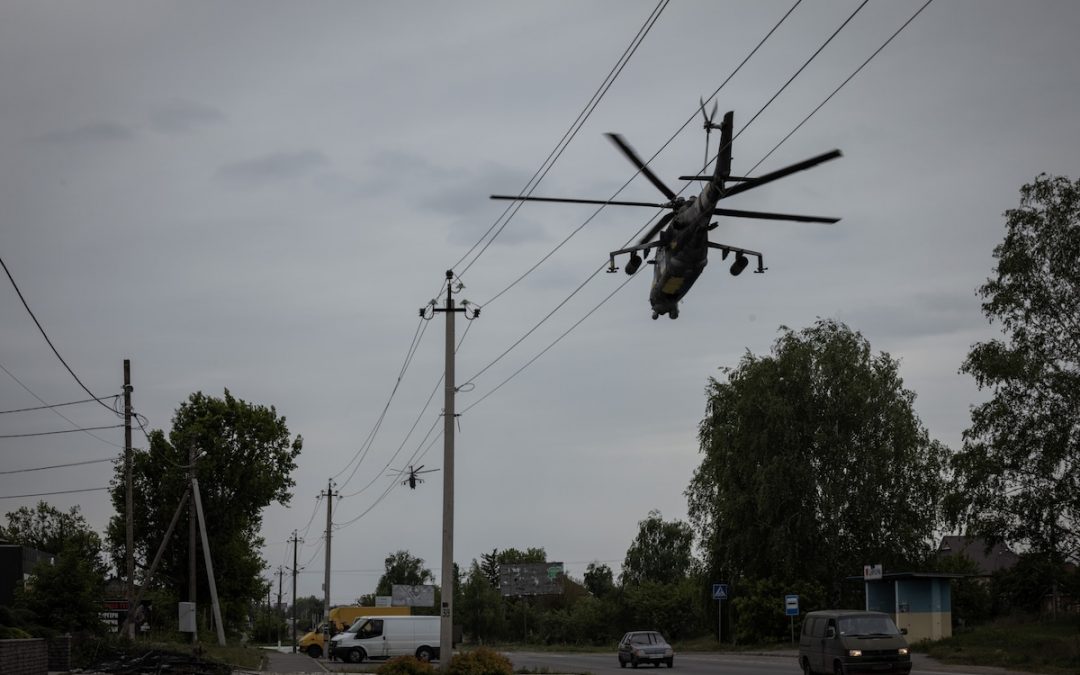
by Editor | May 29, 2024 | News
The Biden administration continues imposing strong tariffs measures on China, now removing tariff exceptions for Chinese exports. It seems that they will be joined soon by Europe, another Pillar. As mentioned last week, the EU is seeking to implement its own tariffs on China for EVs and other industries. At the G7 meeting, leaders expressed concerns over Chinese overproduction flooding their markets – and understandably so, one only has to see the proliferation of Chinese dropshipped goods on Amazon or the marketing push Temu has been on. While free trade is a net positive generally, some bad faith actors can take advantage of it, like the CCP has to assert their authority domestically and expand its influence abroad. Furthermore, dependency on a potential adversary is a national security risk. It seems that the second trade war has begun. It is important that the Four Pillars coordinate these efforts against China, to ensure the highest effectiveness. Furthermore, tariffs on a rival state should not mean tariffs on allies either – even if it may be a political play for the domestic audience, incidents like the US Steel buyout by Nippon Steel only hamper cooperation on peace and security between the Pillars and their allies.
It should be remembered that while some may bemoan the loss of cheap products, the CCP continues to harass and threaten its neighbors – whether it be in the Taiwan Strait, the East and South China Seas, or in the Himalayas. In fact, with the recent inauguration of the new Taiwanese president, China held its vaguely threatening wargame in the Strait and issued a warning that consequences for leaders visiting Taiwan will be harsh. While the CCP makes a show, remember the idiom “China’s Final Warning”, where they send definitive complaints but actually don’t act upon them. In fact, the reason for this phrase’s entry into the English lexicon was Speaker Nancy Pelosi’s visit to Taiwan, before which the CCP raised all kinds of hell about consequences (no action was taken after her landing in Taipei).
However, there are some concerning developments within Europe – and not within Ukraine or Russia this time (we’ll get to that actually). Hungary under Viktor Orban, after embracing Putin and Russia for the past decade, has now begun giving the same treatment to Xi Jinping and China. Hungary is not the only European country to have done so (see: Serbia), but they are the first EU and NATO member to publicly sway to these authoritarian states to this degree. Essentially, there may be a Fifth Column in these vital alliances now, and the EU gives all its member-states a non-overridable veto on key issues. Hungary has already used it to Russia’s advantage, such as voting against aid to Ukraine.
In Ukraine, Kharkiv is under threat again after Russia’s incursion last week. It appears they may be preparing for an offensive in the region. NATO members, parts of the Four Pillars, are now weighing in sending their own soldiers to Ukraine and/or giving the (official) go-ahead for Ukraine to strike Russia directly. President Macron has announced that France will be sending advisors and trainers to Ukraine, while NATO chief Jens Stoltenberg and European leaders like Macron and Chancellor Olaf Scholz said that the US should allow Ukraine to use the supplied weaponries to attack Russia directly.

Ed Ram for The Washington Post
Article of the week – Xi Jinping’s Recipe for Total Control: An Army of Eyes and Ears – The New York Times
Minh Nguyen is the Chief Editor of the Boston Global Forum and a Shinzo Abe Initiative Fellow. She writes the Four Pillars column in the BGF Weekly newsletter.
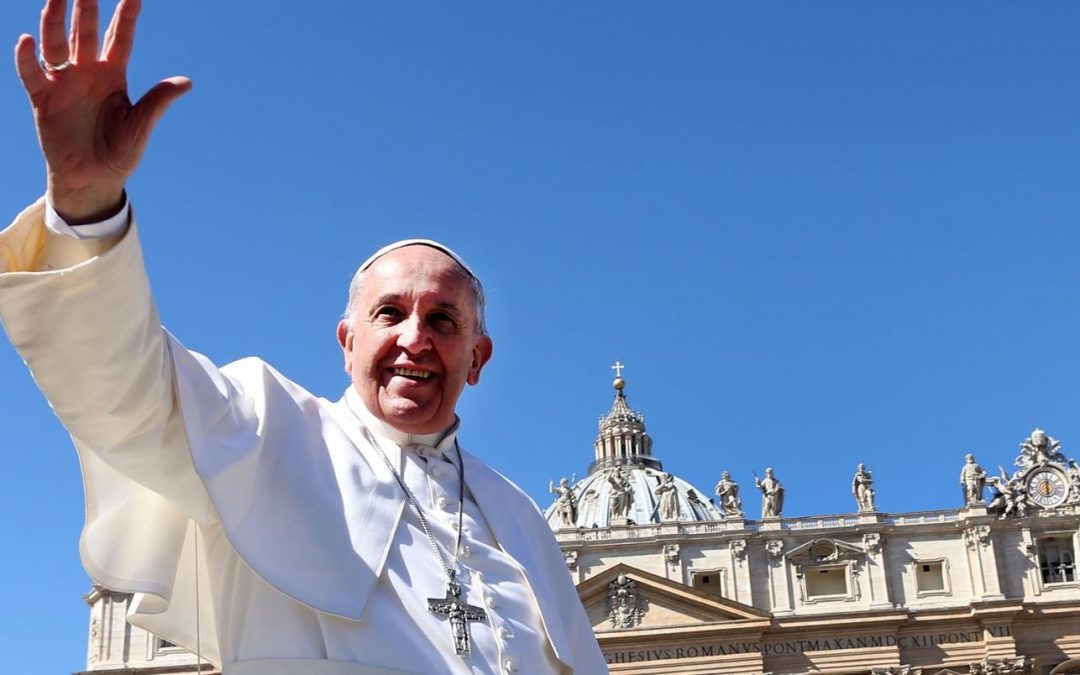
by Editor | May 28, 2024 | Event Updates, News
The International Interreligious Conference 2024 is hosted in Castel Rodolfo, Rome, and Assisi from May 31 to June 4. Here are some highlights of the upcoming event:
- Opening Message, Margaret Karram and Jesús Moran, President and Copresident of the Focolare Movement; May 31
- Called to Weave Relationships of Peace, Amb. Pasquale Ferrara, Prof. Russell G. Pearce, Prof. Adnane Mokrani, Prof. Sunggon Kim; May 31
- The Impact of Artificial Intelligence on Interpersonal and Interreligious Relationships, Mr. Fadi Chehadé, founder of RosettaNet and former CEO of ICANN, Mr. Tuan Anh Nguyen, CEO of the Boston Global Forum, June 1
- Knowledge Platform for AI to be presented and discussed
- “An Economy for Peace”, “Religions and Peace with Creation”, “Faith, Values, and Investments”, June 1 and 2
- Panels and discussions on economic, interfaith, and theological themes
- Pilgrimages and visits to Rome and Assisi, June 3 and 4
- Day in Assisi: Prayer for Peace
- Dialogues and testimonials from various religions, throughout the conference
These highlights reflect the conference’s commitment to fostering a compassionate world through interreligious dialogue, ethical use of technology, and sustainable development – “One Human Family”
Organized by Focolare Movement’s Center for Interreligious Dialogue.

Source: CNN Wire

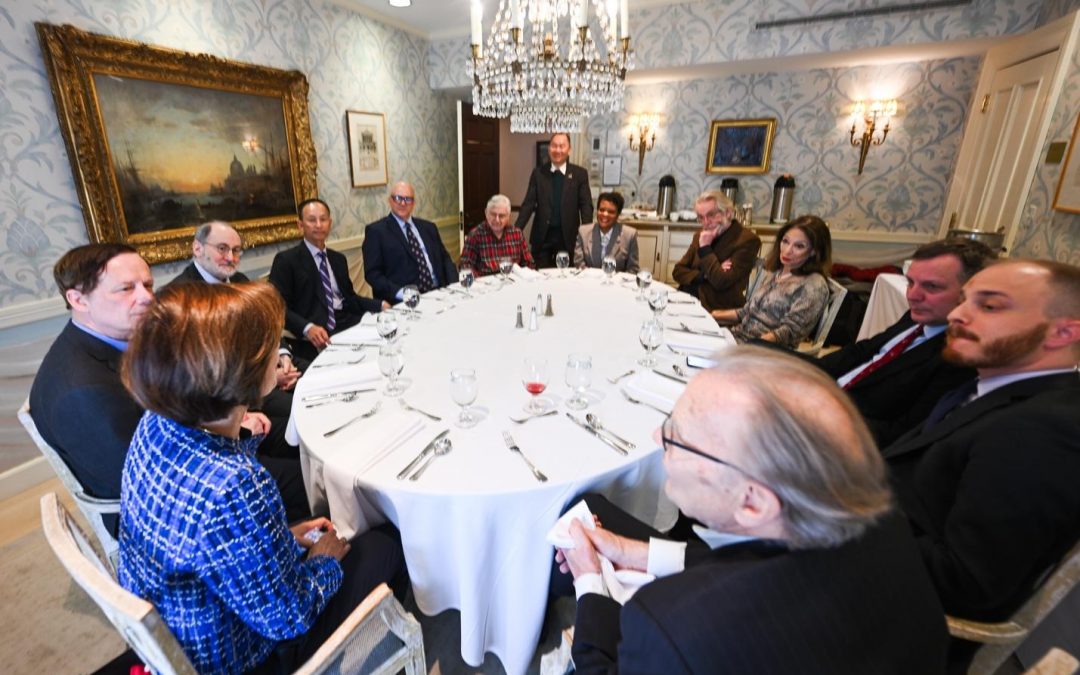
by Editor | May 28, 2024 | Global Alliance for Digital Governance
The Boston Global Forum is in the works of the establishment of AIWS Forum, an initiative that seeks to bridge the AIWS model for AI governance and humanity with key cities across the globe, including Boston, Washington DC, Tokyo, Nha Trang, Bengaluru, and Rome, to collaboratively advance pioneering human-centered AI models that promote peace and security.
The creation of the AIWS Forum follows the remarkable success of the BGF Conference held on April 30, 2024. The conference brought together influential thinkers and leaders, including Alondra Nelson, Ami Fields-Meyer; Professors Alex Pentland, Lily Tsai, Nazli Choucri; Tuan Nguyen, and Jeff Saviano, who presented and discussed transformative ideas on the future of AI governance.
Recognizing the need for a collaborative and global approach to AI governance, the AIWS Forum will serve as a platform for thought leaders and experts to develop and implement AI models that prioritize human values and societal well-being. The forum will feature a distinguished group of coordinators, including Governor Michael Dukakis, Professors Alex Pentland, Nazli Choucri, Thomas Patterson, Martin Nkafu Nkemnkia, and distinguished leaders and thinkers Japanese State Minister Yasuhide Nakayama, French Minister Elisabeth Moreno, Sharad Sharma, and BGF CEO Nguyen Anh Tuan. Their collective expertise and vision will guide the forum’s efforts in pioneering AI innovations that support a peaceful, secure and human-centric world.
With this forum, BGF aims to contribute significantly to global AI governance practices, ensuring that AI technologies are harnessed for the benefit of humanity. The AIWS Forum will foster collaboration, innovation, and the exchange of ideas across continents, driving forward the mission of the AIWS Model and creating a compassionate and ethical AI-driven future.




 Collaborate with Club de Madrid from 2019: the Social Contract for the AI Age and AIWS Model
Collaborate with Club de Madrid from 2019: the Social Contract for the AI Age and AIWS Model




















